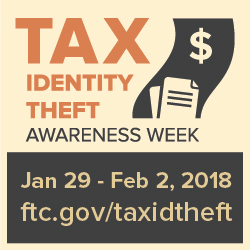 It’s tax season and tax identity thieves are eager to claim your tax refund as their own. Find out how to stop them during Tax Identity Theft Awareness Week, January 29-February 2.
It’s tax season and tax identity thieves are eager to claim your tax refund as their own. Find out how to stop them during Tax Identity Theft Awareness Week, January 29-February 2.
The FTC and its partners are hosting free webinars and Twitter chats to talk about tax identity theft, how to reduce your risk, and what to do if it happens to you. Visit ftc.gov/taxidentitytheft to learn how to participate. Here’s what’s on tap:
- January 29, 2 p.m. EST — The FTC and the Identity Theft Resource Center co-host a webinar for consumers about tax identity theft, IRS imposter scams, how to protect yourself, and recovery steps for victims.
- January 30, 2:30 p.m. EST — The FTC, AARP Fraud Watch Network, AARP Foundation Tax-Aide program, and the Treasury Inspector General for Tax Administration invite consumers to a webinar about tax identity theft and IRS imposter scams.
- January 31, 11 a.m. EST — The FTC and the Department of Veterans Affairs co-host a Twitter chat for service members, veterans, and their families about minimizing your risk of tax identity theft and recovering if you’re a victim.
- January 31, 1 p.m. EST — The FTC, the Department of Veterans Affairs, and the Treasury Inspector General for Tax Administration discuss tax identity theft, IRS imposter scams, and what to do if you become a victim. This is a closed webinar for Veterans Administration employees, patients, and contractors.
- February 1, 1 p.m. EST — The FTC and IRS offer a free webinar for small businesses about tax identity theft, imposter scams that target businesses, cybersecurity, data breaches, and free resources for your business, employees and customers.
- February 1, 3 p.m. EST — The FTC and the Identity Theft Resource Center invite consumers to join a Twitter chat about tax identity theft, its warning signs, and what to do if it happens to you.
In the meantime, the FTC has these tips to fight tax identity theft:
- File your tax return early in the tax season, if you can.
- Use a secure internet connection if you file electronically, or mail your tax return directly from the post office.
- Respond to all mail from the IRS as soon as possible.
- If tax identity theft happens to you, visit IdentityTheft.gov to report it to the FTC, file an Identity Theft Affidavit with the IRS electronically, and get a personal recovery plan.

"Acacian regarding your tax filings from the headquarters which will get expired in ___ next 24 working hours and once again expired after that you will be taken under custody by the local cops as there are ____ serious allegations pressed on your name at this moment we would request you to get back to us so that we can discuss about this case before taking any legal action against you the number to reach us is 470-440-3769 I repeat 470-440-3769 thank you…
In reply to "Acacian regarding your tax by rochel w
In reply to Your suggestions are all by millerf1
In reply to Unfortunately we were by Steshakay2017
If you think and identity thief took your information and filed a tax return and took your refund, go to IdentityTheft.gov. File an Identity Theft Affidavit with the IRS electronically, and get a personal recovery plan.
If you have questions about debts you owed to state or federal agencies you could start by contacting those agencies.